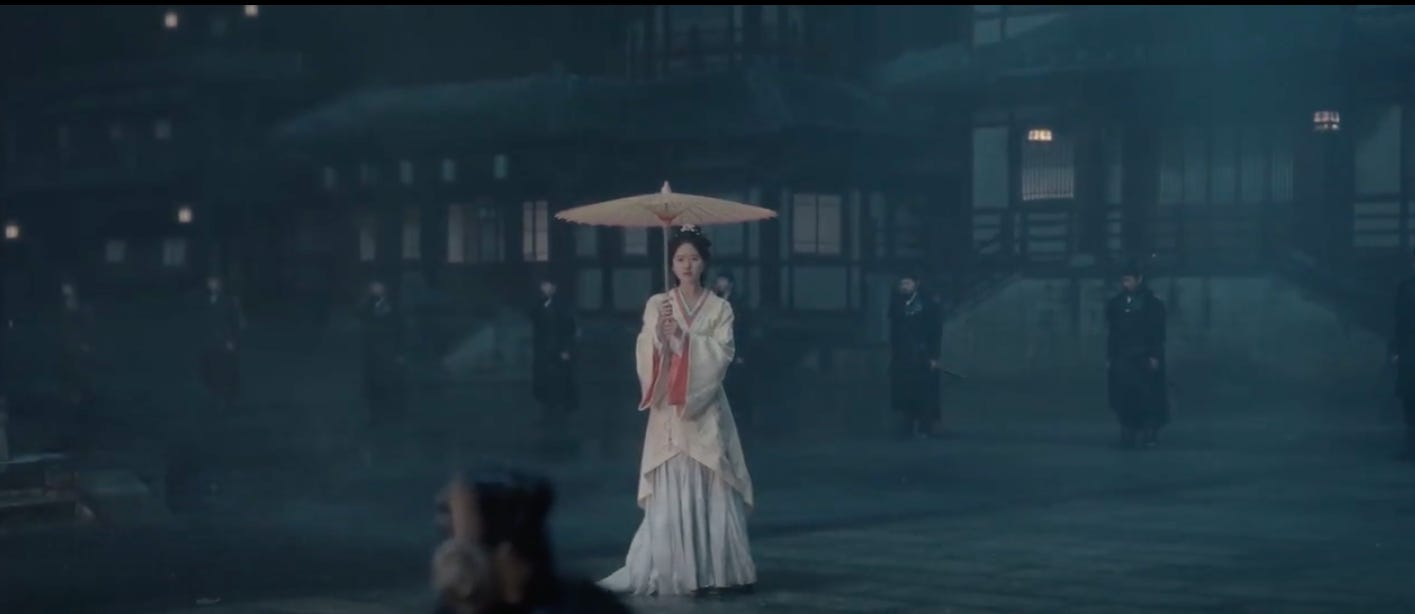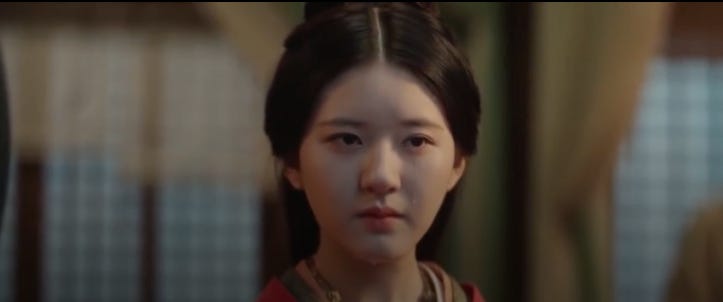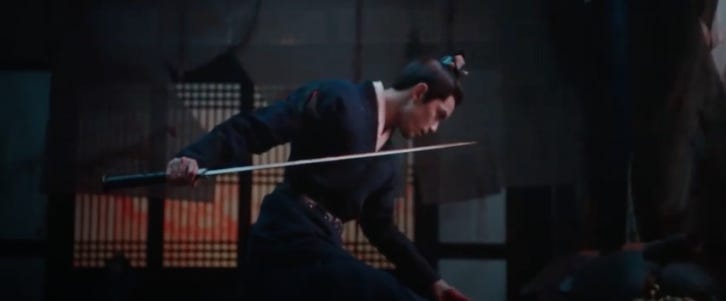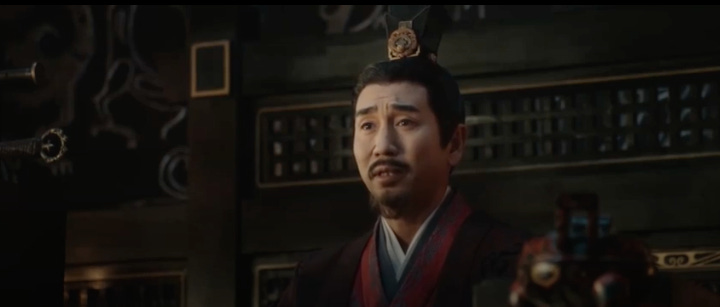Ghost stories aren’t my thing as a rule but I can understand the perennial fascination with them. It isn’t the existence of ghosts themselves that matters to most readers but what they represent for the living — for those left behind. Survivor’s guilt and regret are hugely powerful emotions that play a part in how ghost stories are conceived and told. Ghost stories aren’t about ghosts per se but about grievances and unfinished business. Mixed into all that is regret. That’s my theory at least and for the purposes of this post I intend to stick to it.
This is all relevant because there’s a deeply poignant moment where a partly intoxicated Ling Buyi aka Zisheng aka Huo Wushang confesses to Niaoniao with a haunted sadness in his voice that when he closes his eyes the bloody dead of Gu City are looking at him demanding to know why it is that he hasn’t yet avenged them yet. Then the full weight of his guilt sinks in. “I shouldn’t have survived” followed by the complete realisation of the futility of enduring all this time. “I’ve borne it for over ten years. But in the end, there’s nothing left.” He has doggedly and patiently bided his time only to hit an insurmountable stonewall. All that time playing by the book, putting the pieces together like a proper detective — it was all for naught because once again, he’s been thwarted by the worst villain of them all.
Zisheng has been living out his own ghost story from the day he survived the assault on Gu City. The dead of Gu City follow him everywhere as they take up residence in his memory as if it is their sole mission to remind him at every turn that he is their only hope to gain justice. But now hope has turned into despair: He’s tried everything and in the final analysis, he’s failed to appease the discontented spirits within. In truth this is survivor’s guilt speaking in deafening fashion to spur him on a course to resolution.
In this heartrending, vulnerable moment, Niaoniao decked in her feminine white and pink robe is a ray of light that shines into the dark rainy night surrounded by the black armoured army. She comes to him with her umbrella, offering refuge, sympathy and a listening ear. She tells him that she’s his future wife and will share his burdens no matter what. Moved by her entreaties to trust her he’s on the cusp of telling her who he is when report comes of Huo Junhua’s impending demise.
There’s no doubt that the death of Huo Junhua, his aunt and fellow survivor is what pulls the trigger as far as vengeance is concerned. Before breathing her last, she has a rare moment of lucidity and tells him not to forget their revenge. This strengthens his resolve to finally take matters into his own hands because he’s now truly the sole survivor. It’s unfortunate timing indeed because the course he embarks on takes him away from greater, genuine intimacy with Niaoniao. To protect her from this entire event, and his darker impulses, he decides not to confide in her lest she gets dragged into a fray that he can’t even untangle himself from.
In her final moments Huo Junhua expresses her regrets to General Cui, a man who has loved her all his life and has devoted himself to her care. She acknowledges that she married the “wrong” man an observation made in hindsight. As she fades away she remembers A’Li, her son and calls out to him ensuring that the bond between the cousins would stay alive long enough before the revenge is finally carried out.
Because Love Like the Galaxy is ultimately not about Huo Wushang’s revenge but marriage and family, the role of revenge in the narrative is really a complication, an obstacle to true flourishing in marriage. On the eve of wedded bliss, Zisheng prioritizes his agenda over his woman. Revenge here is a metaphor for that thing… whatever it looks like in any marriage… that keeps couples from being “one flesh”. Whether it’s pornography or finances or the raising of children or even some pet passion, there is always something that keeps couples from having fulfilling marriages that have staying power.
At this point it is obvious that Zisheng doesn’t have the capacity to think of anything else. Revenge is that all-consuming force that overrides all his better judgment. That’s not to say he doesn’t love Niaoniao (he was so desperate to marry her at one point that he organized an engagement party in three days) but because he can’t be honest about this all encompassing matter, he can’t truly wholeheartedly marry her regardless of what anybody’s good intentions might be. It’s akin to what Brutus says in Julius Caesar. “Not that I lov’d Caesar less but I lo’vd Rome more.”
The revenge plot which is a common one in many historical and wuxia dramas is used here as an intrusive element in their relationship as much as it contributes to the whodunit side of things. But for this story it is clearly meant to put the breaks on the romance and create a justification for a separation trope which is all the rage in C dramaland. Cynicism aside, it is a dramatic moment meant to serve up some kind exemplar that happily-ever-after comes only after honest communication from all parties. Marital love is painful and demands commitment from both sides.
On a positive note Niaoniao continues to blossom impressively into a wifely figure. The empress is a good teacher and a good role model in that regard. It’s a role reversal from the good old days when it was Niaoniao who kept him out of the loop. This time it’s her pleading with Zisheng repeatedly to bare his heart to her. Because she’s now really committed to their relationship, she’s willing to dive right in and be the wife in his hour of greatest need. Walking alongside her are the renewed Cheng family who after the events of Tongniu County are more united than ever. A scene that brought tears to my eyes was watching the Cheng family bear arms for their daughter and sister as she goes galloping off to save her fiance from himself.
Although he would say that he is keeping things to himself because it’s his way of protecting her, it’s a fruitless exercise on some level because she knows him well enough these days to know that something is afoot with him. Hence the recurring question: Is there something you need to tell me? She’s not really against the revenge plot which I think he is well aware of but he’s reluctant to let her sink with him into the dark side. This is the problem with Zisheng — his idea of accommodation is about him giving only what is good to her but not wanting her to share in hardship with him. Which is all wrongheaded even if it does come from a place of good intentions. The arm bite marks certainly demonstrate that though they’re both committed to the other, they have very different notions of what that looks like.
The bloody revenge scene cast as a form of shadow puppetry is a fascinating way to frame that moment. It is great theatre just like every scene that involves Ling Buyi in action. He is fearsome foe in any context, a killing machine all on his own. The increasing blood spatter on the screens not only highlights the bloodbath that’s intensifying behind close doors but it’s an attempt to downplay any heroism in the act. It is that one moment that the heroic warrior turns into an antihero. It’s an act of vigilante justice — not sanctioned by the legal code or the legal authority of the day. The only thing we are privy to is Huo Wushang revealing himself to Ling Yi (Marquise Chengyang). The mask is off at last and the first person he declares his true identity to is his enemy before finishing him off in melodramatic fashion. It is fitting that Ling Yi should die in the hands of the son of the man he backstabbed but this entire display of vengeance comes with a very high price tag
The scene is a deliberate contrast to all other that sees Ling Buyi as the penultimate action hero. Here in this instance, is a dark, angry soul that’s giving way to his pent up grief. An assassin bordering on madness and yet a pitiful figure. Ironically what saves Ling Buyi from fully traversing into the outer darkness is the spectre of A’Li, his cousin, the real Ling Buyi who died at the hands of his own father, that helps him retain his humanity despite this violent and brutal demonstration of vengeance. Evoking A’Li before delivering the coup de grace connects him with happier times and provides him with the moral rationale for doing a Hamlet.
Despite all appearances of being a mild-mannered concerned father, Ling Yi has been a dubious character from the first. The sanctimonious woman he chose to be his second wife should have been a clue that this man is thoroughly untrustworthy to begin with. Even in his dealings with her, he’s ruthless and calculating. No doubt he was a villain in every sense, working behind the scenes and was clever enough to evade justice until now but it now seems like Zisheng has known for a very long time that Ling Yi was at least a murderer.
I have little doubt that Ling Yi deserves death for what he did to the inhabitants of Gu City because everything that Ling Buyi does, he does for a good reason. From the beginning his judgment has shown to be good and he’s always been fair. On the issue of not bringing Niaoniao into his confidence in this all important issue, however, he has misjudge the situation and will live to rue the day.










This was definitely splendid theatre work in shadow puppetry. I think the new musical score helped too. I know some people equated it to the scene of "The Red Wedding" from GAME OF THRONES, but I didn't see it that way. I am glad you pointed it out that this isn't really the story of HWS' revenge, because I think the discussion still goes that so many people are upset that he fell in love with Niaoniao when he shouldn't have (me rolling my eyes). I love the scene of her family stepping in and stepping up to help her so she could go rescue the dude in distress! kidding kidding. But it was such a beautiful scene with her in her red dress, riding on the black mare to go save HWS. I still am processing why if he knew all along, he chose this moment finally to execute his plan and kill Ling Yi, given how he's carried this heavy burden for so long. I understand Peng Kun's death and his aunt's death was a domino effect, but I am still trying to logically understand his detective work and the desperation that eventually set the massacre into motion.
As always, a pleasure to read your words, Lily!
Just Wow! You have made me appreciate and understand Huo Bu Yi and Shao Sang's motives because of how you intelligently fleshed out the narrative surrounding them.
Truly a satisfying read! Thank you.😍😍😍